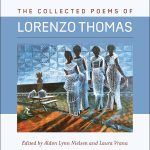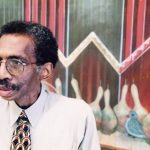
On August 31st, 1944, 76 years ago today, beloved poet Lorenzo Thomas was born in the Republic of Panama. Thomas and his family moved to New York in 1948, where he grew up. After serving in Vietnam, Thomas went to Texas as a writer-in-residence at Texas Southern University in 1973. He stayed in Houston until his death in 2005, teaching as a professor at the University of Houston’s downtown campus. He gave back to the Houston community by teaching writing workshops at the Black Arts Center and by organizing the Juneteenth Blues Festival in Houston as well as in other Texan cities.
Thomas’ poetry is known for its deeply personal and political themes. Thomas was part of the Black Arts Movement in New York City and was the youngest member of the Society of Umbra, which went on to become the Umbra workshop, whose other members included Ishmael Reed, Calvin Hernton, and Tom Dent (to whom the poem below is dedicated). Influenced by the work of Caribbean poet Aimé Césaire, Thomas identified with and was strongly influenced by African American and African culture.
His poetry synthesizes New York School and Black Arts aesthetics, heavily influenced by blues and jazz. In a career that spanned decades, Thomas constantly experimented with form and subject, while still writing poetry deeply rooted in the traditions of African American aesthetics. Whether drawing from his experiences during the war in Vietnam, exploring his life in the urban north and the southwest, or parodying his beloved Negritude ancestors, Thomas was a lyric innovator. His poetry reveals his great knowledge of surrealism, contemporary American popular culture, and cinema. Thomas’ work also highlights his empathy for underprivileged peoples and communities.
Today, we remember Lorenzo Thomas for the immense contributions he has made to the world of poetry and to the study of African-American literature. We share this poem in his remembrance. Between the musical lines of “Discovering American Again,” Thomas offers a meditation and critique of American history and morality that rings true today. With mentions of Black visionaries Marcus Garvey, Booker T. Washington, and W.E.B. Du Bois, Thomas highlights the difficulty that Black Americans have long faced in the struggle against white society for equal rights and fair treatment. He shows that this struggle isn’t a new one: “someone has walked this way before.” Native people have long been familiar with the “veneers… and… valences/ [that] could be false and/…distracting”; they know the demands of white propriety, how it calls for civility before freedom. In this poem, Lorenzo Thomas addresses the memory of the roles and roots of both Indigenous and African people in what we have become accustomed to calling America. Happy 76th Birthday, Lorenzo Thomas!










